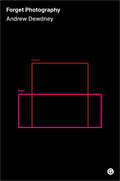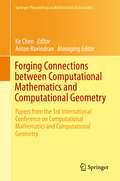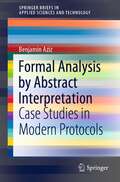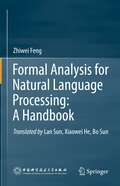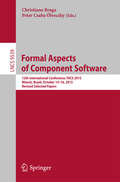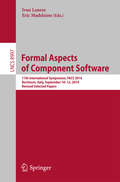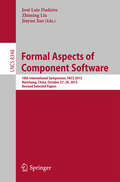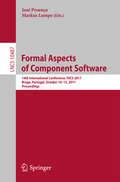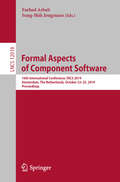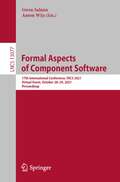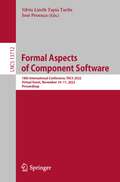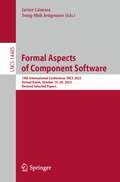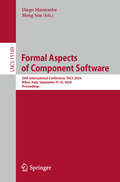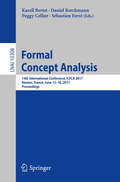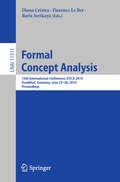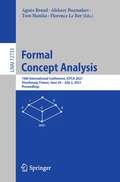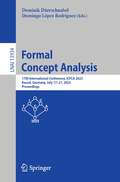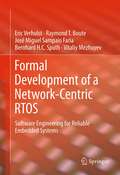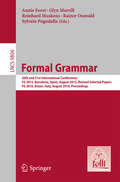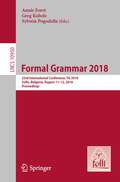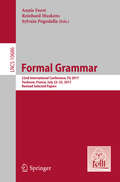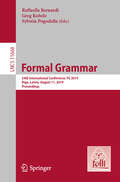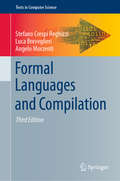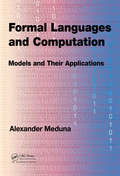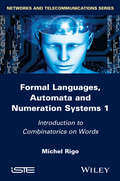- Table View
- List View
Forget Photography
by Andrew DewdneyWhy we must forget photography and reject the frame of reality it prescribes and delineates.The central paradox this book explores is that at the moment of photography's replacement by the algorithm and data flow, photographic cultures proliferate as never before. The afterlife of photography, residual as it may technically be, maintains a powerful cultural and representational hold on reality, which is important to understand in relationship to the new conditions. Forgetting photography is a strategy to reveal the redundant historicity of the photographic constellation and the cultural immobility of its epicenter. It attempts to liberate the image from these historic shackles, forged by art history and photographic theory. More important, perhaps, forgetting photography also entails rejecting the frame of reality it prescribes and delineates, and in doing so opens up other relationships between bodies, times, events, materials, memory, representation and the image. Forgetting photography attempts to develop a systematic method for revealing the limits and prescriptions of thinking with photography, which no amount of revisionism of post-photographic theory can get beyond. The world urgently needs to unthink photography and go beyond it in order to understand the present constitution of the image as well as the reality or world it shows. Forgetting photography will require a different way of organizing knowledge about the visual in culture that involves crossing different knowledges of visual culture, technologies, and mediums. It will also involve thinking differently about routine and creative labor and its knowledge practices within the institutions and organization of visual reproduction.
Forging Connections between Computational Mathematics and Computational Geometry
by Ke Chen Anton RavindranThis volume presents original research contributed to the 3rd Annual International Conference on Computational Mathematics and Computational Geometry (CMCGS 2014), organized and administered by Global Science and Technology Forum (GSTF). Computational Mathematics and Computational Geometry are closely related subjects, but are often studied by separate communities and published in different venues. This volume is unique in its combination of these topics. After the conference, which took place in Singapore, selected contributions chosen for this volume and peer-reviewed. The section on Computational Mathematics contains papers that are concerned with developing new and efficient numerical algorithms for mathematical sciences or scientific computing. They also cover analysis of such algorithms to assess accuracy and reliability. The parts of this project that are related to Computational Geometry aim to develop effective and efficient algorithms for geometrical applications such as representation and computation of surfaces. Other sections in the volume cover Pure Mathematics and Statistics ranging from partial differential equations to matrix analysis, finite difference or finite element methods and function approximation. This volume will appeal to advanced students and researchers in these areas.
Formal Analysis by Abstract Interpretation: Case Studies in Modern Protocols (SpringerBriefs in Applied Sciences and Technology)
by Benjamin AzizThe book provides a gentle introduction and definition of the denotational-based abstract interpretation method. The book demonstrates how the above method of formal analysis can be used, not only to address the security of systems, but other more general and interesting properties related to the testing, mutating and semantic ambiguity resolution of protocols. The book presents three case studies, all related to current complex protocols and standards used in industry, particularly in the context of IoT and Industry 4.0.
Formal Analysis for Natural Language Processing: A Handbook
by Zhiwei FengThe field of natural language processing (NLP) is one of the most important and useful application areas of artificial intelligence. NLP is now rapidly evolving, as new methods and toolsets converge with an ever-expanding wealth of available data. This state-of-the-art handbook addresses all aspects of formal analysis for natural language processing. Following a review of the field’s history, it systematically introduces readers to the rule-based model, statistical model, neural network model, and pre-training model in natural language processing. At a time characterized by the steady and vigorous growth of natural language processing, this handbook provides a highly accessible introduction and much-needed reference guide to both the theory and method of NLP. It can be used for individual study, as the textbook for courses on natural language processing or computational linguistics, or as a supplement to courses on artificial intelligence, and offers a valuable asset for researchers, practitioners, lecturers, graduate and undergraduate students alike.
Formal Aspects of Component Software
by Peter Csaba Ölveczky Christiano BragaThis book constitutes the revised selected papers fromthe 12th International Conference on Formal Aspects of Component Software, FACS2015, held in Niterói, Brazil, in October 2015. The 15 full papers and 2 invited papers presented in thisvolume were carefully reviewed and selected from 33 submissions. They areorganized in topical sections, namely quality of service to withstand faults,component-based software development through research on mathematical modelsfor components, composition and adaptation; rigorous approaches toverification, deployment, testing, and certification.
Formal Aspects of Component Software
by Ivan Lanese Eric MadelaineThis book constitutes revised selected papers from the International Symposium on Formal Aspects of Component Software, FACS 2014, held in Bertinoro, Italy, in September 2014. The 20 full papers presented in this volume were carefully reviewed and selected from 44 submissions. They are organized in topical sections named: compositional approaches; adaptation and evolution; application and experience; tools; scheduling, time and hybrid systems; other verification approaches and safety and liveness of composition. The volume also contains two invited talks, one full paper and one abstract.
Formal Aspects of Component Software
by Zhiming Liu José Luiz Fiadeiro Jinyun XueThis book constitutes the revised selected papers of the 10th International Symposium on Formal Aspects of Component Software, FACS 2013, held in Nanchang, China, in October 2013. The 19 full papers and three invited talks presented were carefully reviewed and selected from 51 submissions. The papers are concerned with how formal methods can be used to make component-based development fit for the new architectures of today and the systems that are now pervading the socio-economic worlds.
Formal Aspects of Component Software
by José Proença Markus LumpeThis book constitutes revised selected papers of the 7th International Workshop on Formal Aspects of Component Software, FACS 2010, held in Guimar#65533;es, Portugal, in October 2010. The 13 full papers and 4 short papers presented together with 1 panel discussion and 2 invited talks were carefully reviewed and selected from 37 submissions. The workshop seeks to develop a better understanding on how formal methods can or should be used for component-based software development to succeed.
Formal Aspects of Component Software: 16th International Conference, FACS 2019, Amsterdam, The Netherlands, October 23–25, 2019, Proceedings (Lecture Notes in Computer Science #12018)
by Farhad Arbab Sung-Shik JongmansThis book constitutes the thoroughly revised selected papers from the 16th International Conference on Formal Aspects of Component Software, FACS 2019, held in Amsterdam, The Netherlands, in October 2019.The 9 full papers presented together with 9 full papers and 3 short papers as well as 2 other papers were carefully reviewed and selected from 27 submissions. FACS 2019 is concerned with how formal methods can be used to make component-based and service-oriented software development succeed. Formal methods have provided a foundation for component-based software by successfully addressing challenging issues such as mathematical models for components, composition and adaptation, or rigorous approaches to verification, deployment, testing, and certification.
Formal Aspects of Component Software: 17th International Conference, FACS 2021, Virtual Event, October 28–29, 2021, Proceedings (Lecture Notes in Computer Science #13077)
by Anton Wijs Gwen SalaünThis book constitutes the thoroughly revised selected papers from the 17th International Symposium, FACS 2021, which was hel virtually in October 2021.The 7 full papers and 1 short contribution were carefully reviewed and selected from 16 submissions and are presented in the volume together with 1 invited paper. FACS 2021 is concerned with how formal methods can be applied to component-based software and system development. The book is subdivided into two blocks: Modelling & Composition and Verification. Chapter "A Linear Parallel Algorithm to Compute Bisimulation and Relational Coarsest Partitions" is available open access under a Creative Commons Attribution 4.0 International License via link.springer.com.
Formal Aspects of Component Software: 18th International Conference, FACS 2022, Virtual Event, November 10–11, 2022, Proceedings (Lecture Notes in Computer Science #13712)
by José Proença Silvia Lizeth Tapia TarifaThis book constitutes the thoroughly revised selected papers from the 18th International Symposium, FACS 2022, which was held online in November 2022.The 12 full papers and 1 short paper were carefully reviewed and selected from 25 submissions. FACS 2021 is focusing on the areas of component software and formal methods in order to promote a deeper understanding of how formal methods can or should be used to make component-based software development succeed.
Formal Aspects of Component Software: 19th International Conference, FACS 2023, Virtual Event, October 19-20, 2023, Revised Selected Papers (Lecture Notes in Computer Science #14485)
by Sung-Shik Jongmans Javier CámaraThis book constitutes the refereed proceedings of the 19th International Conference on Formal Aspects of Component Software, FACS 2023, which took place virtually during October 19-20, 2023.The 11 full papers included in this book were carefully reviewed and selected from 23 submissions. They were organized in topical sections as follows: cloud computing, cyber-physical and critical systems, and the Internet of Things.
Formal Aspects of Component Software: 20th International Conference, FACS 2024, Milan, Italy, September 9–10, 2024, Proceedings (Lecture Notes in Computer Science #15189)
by Meng Sun Diego MarmsolerThis book constitutes the refereed proceedings of the 20th International Conference on Formal Aspects of Component Software, FACS 2024, held in Milan, Italy, during September 9-10, 2024. The 7 full papers and 1 short paper included in this book were carefully reviewed and selected from 16 submissions. They are organized in topical sections as follows: verification and testing, formal models, and security and blockchain.
Formal Concept Analysis: 14th International Conference, ICFCA 2017, Rennes, France, June 13-16, 2017, Proceedings (Lecture Notes in Computer Science #10308)
by Karell Bertet, Daniel Borchmann, Peggy Cellier and Sébastien FerréThis book constitutes the proceedings of the 14th International Conference on Formal Concept Analysis, ICFCA 2017, held in Rennes, France, in June 2017. The 13 full papers presented in this volume were carefully reviewed and selected from 37 submissions. The book also contains an invited contribution and a historical paper translated from German and originally published in “Die Klassifkation und ihr Umfeld”, edited by P. O. Degens, H. J. Hermes, and O. Opitz, Indeks-Verlag, Frankfurt, 1986.The field of Formal Concept Analysis (FCA) originated in the 1980s in Darmstadt as a subfield of mathematical order theory, with prior developments in other research groups. Its original motivation was to consider complete lattices as lattices of concepts, drawing motivation from philosophy and mathematics alike. FCA has since then developed into a wide research area with applications much beyond its original motivation, for example in logic, data mining, learning, and psychology.
Formal Concept Analysis: 15th International Conference, ICFCA 2019, Frankfurt, Germany, June 25–28, 2019, Proceedings (Lecture Notes in Computer Science #11511)
by Florence Le Ber Diana Cristea Baris SertkayaThis book constitutes the proceedings of the 15th International Conference on Formal Concept Analysis, ICFCA 2019, held in Frankfurt am Main, Germany, in June 2019.The 15 full papers and 5 short papers presented in this volume were carefully reviewed and selected from 36 submissions. The book also contains four invited contributions in full paper length. The field of Formal Concept Analysis (FCA) originated in the 1980s in Darmstadt as a subfield of mathematical order theory, with prior developments in other research groups. Its original motivation was to consider complete lattices as lattices of concepts, drawing motivation from philosophy and mathematics alike. FCA has since then developed into a wide research area with applications much beyond its original motivation, for example in logic, data mining, learning, and psychology.
Formal Concept Analysis: 16th International Conference, ICFCA 2021, Strasbourg, France, June 29 – July 2, 2021, Proceedings (Lecture Notes in Computer Science #12733)
by Florence Le Ber Agnès Braud Aleksey Buzmakov Tom HanikaThis book constitutes the proceedings of the 16th International Conference on Formal Concept Analysis, ICFCA 2021, held in Strasbourg, France, in June/July 2021. The 14 full papers and 5 short papers presented in this volume were carefully reviewed and selected from 32 submissions. The book also contains four invited contributions in full paper length. The research part of this volume is divided in five different sections. First, "Theory" contains compiled works that discuss advances on theoretical aspects of FCA. Second, the section "Rules" consists of contributions devoted to implications and association rules. The third section "Methods and Applications" is composed of results that are concerned with new algorithms and their applications. "Exploration and Visualization" introduces different approaches to data exploration.
Formal Concept Analysis: 17th International Conference, ICFCA 2023, Kassel, Germany, July 17–21, 2023, Proceedings (Lecture Notes in Computer Science #13934)
by Dominik Dürrschnabel Domingo López RodríguezThis book constitutes the proceedings of the 17th International Conference on Formal Concept Analysis, ICFCA 2023, which took place in Kassel, Germany, in July 2023.The 13 full papers presented in this volume were carefully reviewed and selected from 19 submissions. The International Conference on Formal Concept Analysis serves as a platform for researchers from FCA and related disciplines to showcase and exchange their research findings. The papers are organized in two topical sections, first "Theory" and second "Applications and Visualization".
Formal Development of a Network-Centric RTOS
by Eric Verhulst José Miguel Faria Raymond T. Boute Vitaliy Mezhuyev Bernhard H.C. SputhMany systems, devices and appliances used routinely in everyday life, ranging from cell phones to cars, contain significant amounts of software that is not directly visible to the user and is therefore called "embedded". For coordinating the various software components and allowing them to communicate with each other, support software is needed, called an operating system (OS). Because embedded software must function in real time (RT), a RTOS is needed. This book describes a formally developed, network-centric Real-Time Operating System, OpenComRTOS. One of the first in its kind, OpenComRTOS was originally developed to verify the usefulness of formal methods in the context of embedded software engineering. Using the formal methods described in this book produces results that are more reliable while delivering higher performance. The result is a unique real-time concurrent programming system that supports heterogeneous systems with just 5 Kbytes/node. It is compatible with safety related engineering standards, such as IEC61508.
Formal Grammar
by Rainer Osswald Annie Foret Glyn Morrill Reinhard Muskens Sylvain PogodallaThis book constitutes the refereed proceedings of the 19 International Conference on Formal Grammar 2014, collocated with the European Summer School in Logic, Language and Information in August 2014. The 10 revised full papers presented together with 2 invited contributions were carefully reviewed and selected from a total of 19 submissions. Traditionally linguistics has been studied from the point of view of the arts, humanities and letters, but in order to make concrete ideas which might otherwise be fanciful the study of grammar has been increasingly subject to the rigours of computer science and mathematization i. e. articulation in the language of science.
Formal Grammar 2018: 23rd International Conference, FG 2018, Sofia, Bulgaria, August 11-12, 2018, Proceedings (Lecture Notes in Computer Science #10950)
by Annie Foret Sylvain Pogodalla Greg KobeleEdited in collaboration with FoLLI, the Association of Logic, Language and Information, this book constitutes the refereed proceedings of the 23rd International Conference on Formal Grammar, FG 2018, collocated with the European Summer School in Logic, Language and Information in August 2018. The 7 full papers were carefully reviewed and selected from 11 submissions.The focus of papers are as follows: Formal and computational phonology, morphology, syntax, semantics, andpragmatics Model-theoretic and proof-theoretic methods in linguistics Logical aspects of linguistic structure Constraint-based and resource-sensitive approaches to grammar Learnability of formal grammar Integration of stochastic and symbolic models of grammar Foundational, methodological, and architectural issues in grammar and linguistics Mathematical foundations of statistical approaches to linguistic analysis
Formal Grammar: 22nd International Conference, FG 2017, Toulouse, France, July 22-23, 2017, Revised Selected Papers (Lecture Notes in Computer Science #10686)
by Annie Foret Reinhard Muskens Sylvain PogodallaEdited in collaboration with FoLLI, the Association of Logic, Language and Information, this book constitutes the refereed proceedings of the 22nd International Conference on Formal Grammar, FG 2017, collocated with the European Summer School in Logic, Language and Information in July 2017. The 9 contributed papers were carefully reviewed and selected from 14 submissions.The focus of papers are as follows: Formal and computational phonology, morphology, syntax, semantics and pragmatics Model-theoretic and proof-theoretic methods in linguistics Logical aspects of linguistic structure Constraint-based and resource-sensitive approaches to grammar Learnability of formal grammar Integration of stochastic and symbolic models of grammar Foundational, methodological and architectural issues in grammar and linguistics Mathematical foundations of statistical approaches to linguistic analysis
Formal Grammar: 24th International Conference, FG 2019, Riga, Latvia, August 11, 2019, Proceedings (Lecture Notes in Computer Science #11668)
by Sylvain Pogodalla Greg Kobele Raffaella BernardiEdited in collaboration with FoLLI, the Association of Logic, Language and Information, this book constitutes the refereed proceedings of the 24th International Conference on Formal Grammar, FG 2019, held in Riga, Latvia, in August 2019, in conjunction with the 31st European Summer School in Logic, Language and Information, ESSLI 2019.The 7 full papers presented were carefully reviewed and selected from 11 submissions. They present new and original research on formal grammar, mathematical linguistics, and the application of formal and mathematical methods to the study of natural language and focus on topics such as formal and computational phonology, morphology, syntax, semantics, and pragmatics; model-theoretic and proof-theoretic methods in linguistics; logical aspects of linguistic structure; constraint-based and resource-sensitive approaches to grammar; learnability of formal grammar; integration of stochastic and symbolic models of grammar; foundational, methodological, and architectural issues in grammar and linguistics; and mathematical foundations of statistical approaches to linguistic analysis.
Formal Languages and Compilation (Texts in Computer Science)
by Stefano Crespi Reghizzi Luca Breveglieri Angelo MorzentiThis classroom-tested and clearly-written textbook presents a focused guide to the conceptual foundations of compilation, explaining the fundamental principles and algorithms used for defining the syntax of languages, and for implementing simple translators. <P><P> This significantly updated and expanded third edition has been enhanced with additional coverage of regular expressions, visibly pushdown languages, bottom-up and top-down deterministic parsing algorithms, and new grammar models. <P><P> Topics and features: describes the principles and methods used in designing syntax-directed applications such as parsing and regular expression matching; covers translations, semantic functions (attribute grammars), and static program analysis by data flow equations; introduces an efficient method for string matching and parsing suitable for ambiguous regular expressions (NEW); presents a focus on extended BNF grammars with their general parser and with LR(1) and LL(1) parsers (NEW); introduces a parallel parsing algorithm that exploits multiple processing threads to speed up syntax analysis of large files; discusses recent formal models of input-driven automata and languages (NEW); includes extensive use of theoretical models of automata, transducers and formal grammars, and describes all algorithms in pseudocode; contains numerous illustrative examples, and supplies a large set of exercises with solutions at an associated website. <P><P> Advanced undergraduate and graduate students of computer science will find this reader-friendly textbook to be an invaluable guide to the essential concepts of syntax-directed compilation. The fundamental paradigms of language structures are elegantly explained in terms of the underlying theory, without requiring the use of software tools or knowledge of implementation, and through algorithms simple enough to be practiced by paper and pencil.
Formal Languages and Computation: Models and Their Applications
by Alexander MedunaFormal Languages and Computation: Models and Their Applications gives a clear, comprehensive introduction to formal language theory and its applications in computer science. It covers all rudimental topics concerning formal languages and their models, especially grammars and automata, and sketches the basic ideas underlying the theory of computatio
Formal Languages, Automata and Numeration Systems 1: Introduction to Combinatorics on Words
by Michel RigoFormal Languages, Automaton and Numeration Systems presents readers with a review of research related to formal language theory, combinatorics on words or numeration systems, such as Words, DLT (Developments in Language Theory), ICALP, MFCS (Mathematical Foundation of Computer Science), Mons Theoretical Computer Science Days, Numeration, CANT (Combinatorics, Automata and Number Theory). Combinatorics on words deals with problems that can be stated in a non-commutative monoid, such as subword complexity of finite or infinite words, construction and properties of infinite words, unavoidable regularities or patterns. When considering some numeration systems, any integer can be represented as a finite word over an alphabet of digits. This simple observation leads to the study of the relationship between the arithmetical properties of the integers and the syntactical properties of the corresponding representations. One of the most profound results in this direction is given by the celebrated theorem by Cobham. Surprisingly, a recent extension of this result to complex numbers led to the famous Four Exponentials Conjecture. This is just one example of the fruitful relationship between formal language theory (including the theory of automata) and number theory.
